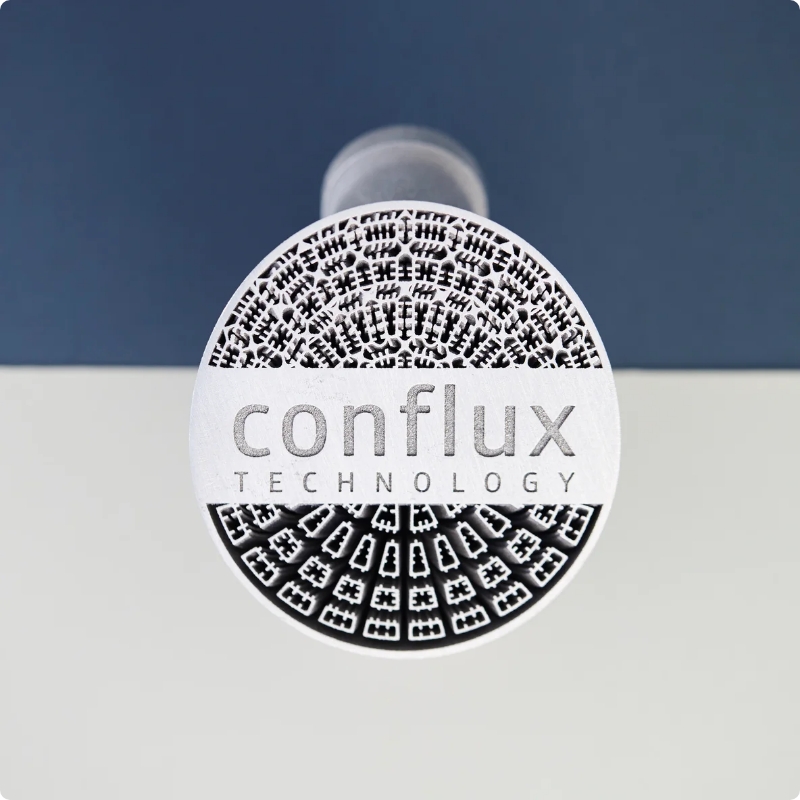
3D Printing in Practice
Cooling Elements and Heat Exchangers From a Metal 3D Printer
More Energy Efficiency With
Additive Manufacturing
For many applications, sophisticated cooling technology is important. For gaming PCs, data centers, automobiles, LED modules, the chemical industry and many more; wherever you need to dissipate heat, heat exchangers and cooling elements are essential. Their size is often a challenge. For example, hand-held electronic devices need to house increasingly powerful technology that requires cooling. In addition, they need to integrate new functionality quickly, meaning that the heat problem needs to be solved again and again. This quickly pushes conventional production processes to their limits.
However, industrial 3D printing is different. It enables very small and complex parts to be made from alloys with favorable thermal conduction properties. As a result, heat management can be performed in a very small space. For example, CPU coolers with liquid cooling but no weak points susceptible to leakage can be mass-produced in a single piece.
Additive manufacturing makes it possible to efficiently manufacture especially compact heat transport solutions that set new standards in terms of effectiveness, reliability and space usage.
Our Portfolio for the Additive Manufacturing of Heat Exchangers & Cooling Elements
High-Quality Systems and Materials
Our systems allow you to manufacture heat exchangers from high-quality thermally conductive alloys with a number of advantageous properties using 3D CAD data. Flexible design, optimized heat transfer properties and reduced build size are just a few examples.

Betatype‘s unique design & process optimization enables additive manufacturing of 384 qualified heatsinks in one batch on an EOSINT M 280
Play video
Advantages of Additive Manufacturing for Heat Exchangers
-
Lightweight and space-efficient
Direct Metal Laser Solidification (DMLS) makes it possible to manufacture heat exchangers that are lighter and require less space, featuring complex geometries and maximal surface area.
-
Highly complex cooling channels
When it comes to making internal cooling channels with complex shapes, additive manufacturing should be your first choice.
-
Parts without joints
The 3D printing process creates parts in a single piece. This avoids any assemblies with welded seams, eliminating the risk of leakage.
-
Excellent thermal conductivity
A wide range of materials with excellent thermal conductivity properties are available for additive manufacturing. The shape freedom also enables heat transfer paths to be minimized.
-
Reach the market quickly
Additive manufacturing accelerates the path from prototype through pilot series production to series production, speeding up market entry.
Success Story
Conflux Technology
Conflux Technology is a provider of additive manufacturing applications specializing in thermal and fluid dynamic solutions. The Australian company created a new design for heat exchangers with their Conflux CoreTM heat exchanger, which is used for example in the automotive, oil and gas industries, as well as in chemical process technology. The goal was to achieve higher performance in a smaller space.
According to Conflux Technology, EOS had the only solution. Working together in a collaborative partnership, they created six prototypes within just a few months, eventually resulting in a patented end product. During this process, they took advantage of various EOS software tools for data processing, process optimization and quality assurance.
The results: a heat exchanger with triple the heat dissipation and 22 % less weight that is 55 mm smaller.
Find out more
Cross-section of a Conflux Core™ heat exchanger printed in 3D on the EOS M 290
Success Story Betatype
Cooling Elements for LED Headlights
Betatype is a technology company specializing in design for 3D printing and process control in industries such as the consumer goods, medical and automotive sectors. Constantly working to push the limits of additive manufacturing even further, the young company optimized the design and unit costs of cooling elements for automotive LED lights during this project. Improving the efficiency was the key focus. The production partners Progressive Technology supported them with the project.
The part was customized with the 3D printing system EOSINT M 280. By carefully balancing the stacking of cooling elements while also minimizing support structures, the available space was exploited optimally: 384 parts were manufactured in a single batch. An optimized design and intelligent laser scanning paths reduced the production time from 444 hours to just 34 hours. This provided significant cost advantages to Betatype’s customers: the unit costs were reduced by 90 %.
More about 3D printing for vehiclesOur webinar
Stay Cool 3D Printing Solutions for Thermal Management
In this webinar, you’ll learn how additive manufacturing can help control heat and break the boundaries of miniaturization as in the case of heat exchangers.
To the free webinar


Metal 3D printing is an exciting and disruptive technology. But initially I was skeptical whether its advantages would extend to meet our own requirements. Three years on, it has given us solutions for many projects that would not have been possible otherwise.
Dr. Jens Struckmeier | CTO | Founder of Cloud & Heat